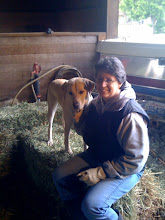No matter what side you are on the slaughter issue. Something needs to be done.
http://www.richardbealblog.com/
Read Richards post.
Dont send your horses to an auction, humanly dispose of them when needed.
A sad time in the US for horses.
4 days ago











I have a comment for this one. I do not care for slaughter, I believe in selective and responsible breeding."Colt mills"are just as bad as puppy mills. I also beleive that the costs to humanely dispose of a horse is over the top and out of control. Not everyone lives in the country with ability to put their old or injured horse down with a lovely grave marker in the back forty. There needs to be an affordable option besides slaughter or dumping and leaving them to "fend for themselves like a wild horse". I beleive that a solution can be found if humans could ever find a way to put aside their financial agenda's and focus on what is what is right for the horses.
ReplyDeleteThanks for the link. I'm actually pleased that the slaughter plants are rejecting U.S. horses, and I am hoping that this will force us in the U.S. to find a alternative solution to these "unwanted" horses. Even if there was a push to reopen a U.S. slaughter plant, it would take some time to get it up and running, and hopefully in the meantime we will have found a solution -- out of necessity -- that will silence the pro-slaughter advocates' claims that slaughter is the only way to deal with the so-called unwanted horses.
ReplyDeleteThe Europeans had to do for themselves what the US FDA refused to do...they've always known that the horses being sent to slaughter were tainted with drugs and they didn't care. Just like they don't care what's in our nation's food supply. Slaughter is not the answer to the over-population of horses. Never was and never will be. It's a nasty business. Responsible breeding is the answer. That's exactly why you rarely see certain breeds at auctions or being sold to slaughter. As an example, Fresians, Warmbloods, Lusitanos, Andalusians, Dales...on and on goes the list of responsible breed associations with high standards of what types of animals can be produced and registered. Note that they're also (still) expensive. Now for comparison, look at the AQHA, APHA, ApHC, Arabians, Thoroughbreds, Morgans...produced in mass quantity and dirt cheap. See the bigger picture?
ReplyDeleteKudos to you all.
ReplyDeleteI am not for, or against, slaughter. I thought this article was very interesting and again brings to light another dilemma for American horse owners.
We put so many more chemicals into our horses than they are allowed to in Europe. But then our culture does not eat them either.
I dont see a lot of "colt mills" My opinion is that it wouldnt happen if people wouldnt want a "cheap" horse. The dabbler, the one who wants a horse or pony for their kid, but when the kids loses interest or grows up, dumps the horse.
The best I can do at this time is be as responsible of a horse owner as I can, do not contribute to the problem. I own three mares, never have I wanted to breed to get my "own" foal. Realistically I do not have the, one, money, or facilities to properly raise one.
So I will take care of the ones I have got, until they die. The market wont let me sell the old and lame ones I have. They have given me, and my girls much much pleasure and fun and love.
Sh*tty situation all around , there are "unwanted " horses everywhere due less to "colt mills" than to inexperience negligence and carelessness, not only do breeders need to be selective in breeding ,but also in placing the foal/horses when sold. People need to know all that is involved in owning & caring for a horse.Education is not the only solution by far ,but is a heck of a start
ReplyDeleteI agree Fernvalley!!
ReplyDeleteThank you for being one of the responsible ones!!
Slaughter has it's place. There is nothing wrong with slaughter as long as it's done as humane, painless and quickly as possible. We slaughter pigs, cows, chicken, sheep, goats, boars, deer for food and resources. As long as it's done humanely I have absolutely no issues with it at all.
ReplyDeleteI agree Sandra!!
ReplyDeleteuggghhh - how many horses must suffer before we can all be realistic in agreeing how to help them!
ReplyDelete- The Equestrian Vagabond